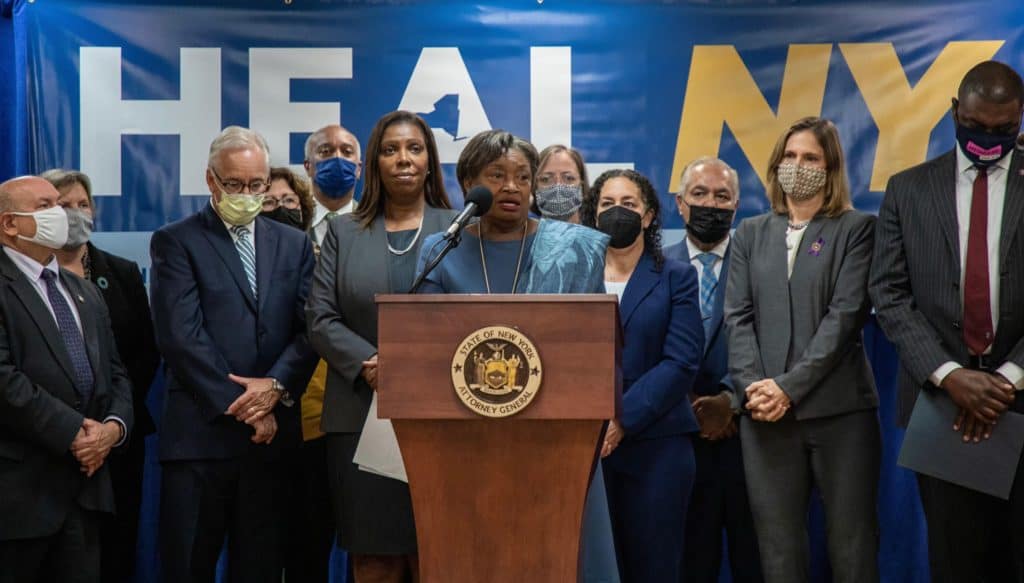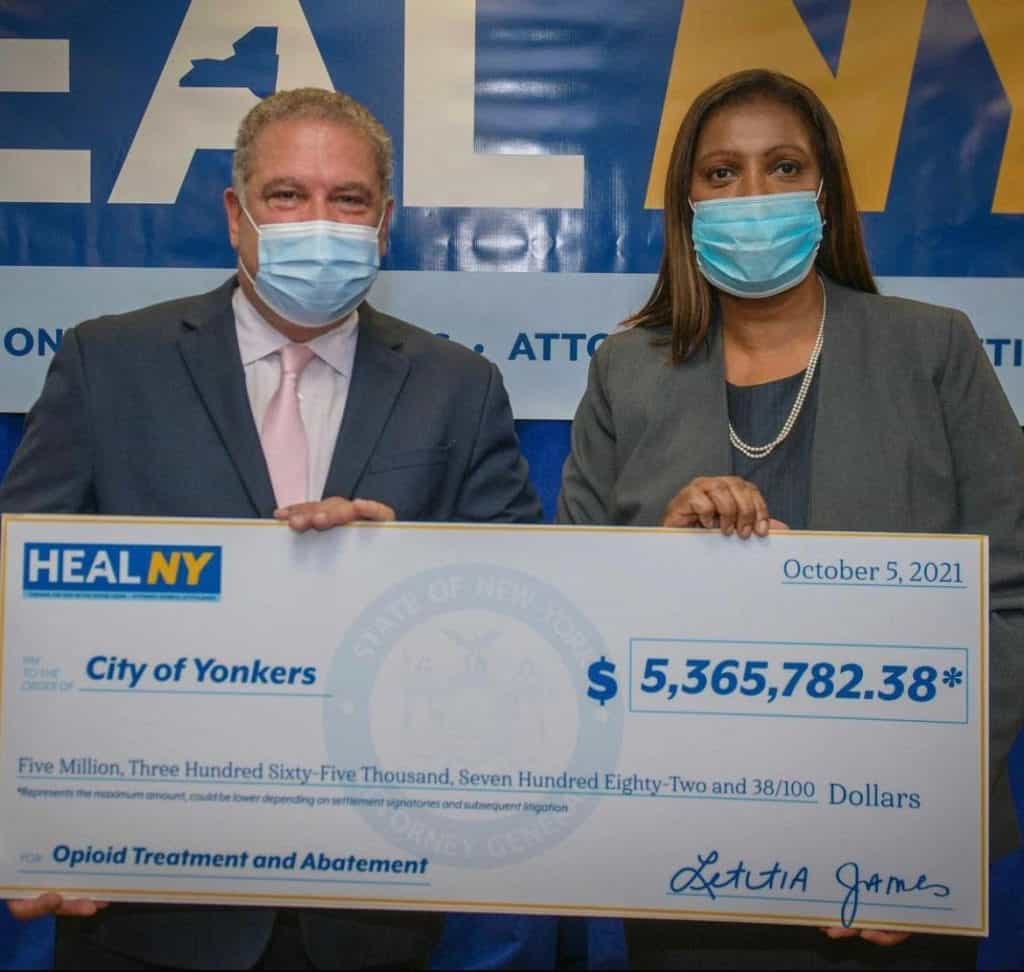

New York Attorney General Letitia James today continued her statewide ‘HealNY’ tour of New York state with a stop in Westchester County today, where she announced that she will deliver up to $94 million for the Hudson Valley to combat the opioid epidemic. The funds come from different settlements Attorney General James has negotiated following her March 2019 lawsuit against the various manufacturers and distributors responsible for the opioid crisis. Attorney General James’ tour will make stops in dozens of New York counties throughout the month of October, with up to $1.5 billion in funds going to counties across New York state.
“After more than two decades of having lethal opioids spread across every county of the Hudson Valley, today we are helping this community heal by announcing we will be delivering up to $94 million to invest in opioid prevention, treatment, and recovery,” said Attorney General James. “These funds will help the Hudson Valley turn the tide on the opioid crisis. While no amount of money will ever make up for all the lives lost, these funds will be vital in helping to prevent future deaths.”
The lawsuit Attorney General James filed in 2019 was, at the time, the nation’s most extensive lawsuit against the various manufacturers and distributors of opioids. These manufacturers and distributors were responsible for heavily marketing opioids to doctors, hospitals, health care systems, and others, which led to the over prescription of the drugs across New York and the rest of the nation over the last two decades. The manufacturers named in Attorney General James’ complaint included Purdue Pharma and its affiliates, as well as members of the Sackler Family (owners of Purdue) and trusts they control; Janssen Pharmaceuticals and its affiliates (including its parent company Johnson & Johnson); Mallinckrodt LLC and its affiliates; Endo Health Solutions and its affiliates; Teva Pharmaceuticals USA, Inc. and its affiliates; and Allergan Finance, LLC and its affiliates. The distributors named in the complaint were McKesson Corporation, Cardinal Health Inc., Amerisource Bergen Drug Corporation, and Rochester Drug Cooperative Inc.
Last month, a settlement that secured more than $4.5 billion — at least $200 million of which will be earmarked for New York — from the Sackler family and foundations that they control, ends the Sacklers’ ability to manufacture opioids ever again, and will shut down Purdue Pharma was announced. In July, a settlement with McKesson, Cardinal Health, and Amerisource Bergen that will deliver up to $1 billion to New York state to combat the opioid epidemic was announced.
In June, a settlement that ended Johnson & Johnson’s sale of opioids nationwide and that will deliver $230 million to New York alone was announced. The cases against Mallinckrodt and Rochester Drug Cooperative are now moving separately through U.S. Bankruptcy Court. The trial against the two remaining defendants — Teva Pharmaceuticals USA and Allergan Finance — is currently underway and continues in state court.
Pursuant to the new law establishing the opioid settlement fund, all funds collected by the state from opioid settlements or litigation victories will be allocated specifically for abatement efforts in communities devastated by the opioid epidemic and will not go towards the state’s general fund. Every region in the state will receive millions of dollars for prevention, treatment, and recovery programs to combat the opioid crisis.
Westchester County received $13.5 Million in funds to combat and treat Opioid abuse, and the City of Yonkers received $5.3 Million, for a combined total of $18.8 Million. And, as the other lawsuits and bankruptcies continue, more funds may be coming.
“I want to thank Attorney General Tish James for fighting to secure these funds. This year, the State Senate and State Assembly, working in partnership with the attorney general, passed legislation to guarantee that these funds from opioid settlements are used for the development of new services and support,” said State Senate Majority Leader Andrea Stewart-Cousins. “We can’t bring back the tragic losses experienced by too many families in Westchester and across New York state, but we can and will seek justice. In addition to these efforts, the Senate Majority has passed impactful legislation, based upon input received by the Joint Senate Task Force on Opioids, Addiction, & Overdose Prevention that I convened, to support those fighting addiction and expand government services. I will continue to work with my partners in state government to provide the prevention and addiction services people need and deserve to end this scourge.”
“The impact of opioid abuse on individuals and families is devastating,” said State Senator Shelley Mayer. “I applaud Attorney General James for holding manufacturers and distributors accountable, and I am pleased the money from these settlements will soon begin to heal communities across New York state, including right here at St. Vincent’s Hospital.”
“The opioid settlements negotiated by Attorney General James is an important step along the path to a reduction in opioid addiction and healing for our community,” said State Assemblymember Amy Paulin. “I thank her for bringing this issue to the forefront and holding the pharmaceutical companies accountable.”
“Attorney General Letitia James is commended for delivering crucial funding from opioid settlements to Yonkers,” said State Assemblymember Nader Sayegh. “The funding will expand services to deter drug addiction and encourage treatment and lifestyle changes.”
“Westchester County knows far too well the devastating impacts of the opioid epidemic — the lives cut short and the families torn apart,” said Westchester County Executive George Latimer. “Thank you to New York Attorney General Letitia James for her leadership and for helping Westchester County fight back against opioid addiction. Westchester County is set to receive a minimum of $10.6 million and a maximum of $18.8 million under the settlement — this is a significant amount of money that will help countless victims rebuild their lives.”
“Families and communities have been destroyed by the opioid epidemic,” said Westchester District Attorney Miriam E. Rocah. “I commend New York Attorney General Letitia James for holding the opioid manufacturers accountable for their actions. Too many families have lost loved ones to addiction and overdose, and my office is committed to seeking justice for those families. We will continue to charge people who knowingly distribute opioids illegally and also assist those struggling with addiction to get treatment and support. I look forward to working with my government and community partners to help ensure that these settlement funds are used most effectively to help communities rebuild and recover and prevent and treat addiction and overdose.”
“The opioid crisis has destroyed many of our communities and these settlements will provide the much-needed recognition that Big Pharma played a significant role in the ruin of millions of lives,” said Yonkers Mayor Mike Spano. “I applaud Attorney General James for fighting for our families and providing local municipalities, like Yonkers, the valuable resources to invest in abatement programs to prevent further devastation.”
“Attorney General Letitia James has led the fight to hold those responsible for the horrors of the opioid epidemic accountable, and we are now seeing the results of this effort,” said Ardsley resident Stephanie Marquesano, founder or The Harris Project. “This is very personal to my family and me, as my 19-year-old son Harris misused opioids and died by accidental overdose in 2013. Our repeated attempts to get the appropriate treatment for his addiction and mental health challenges — co-occurring disorders — failed because the system was not designed to meet his needs. We founded The Harris Project with a mission of improving outcomes for the millions with co-occurring disorders. We thank Attorney General James and the New York State Legislature for putting safeguards in place, so these dollars do not simply go to the state general fund, but will be used to build a better system of care across the continuum — enhancing prevention, intervention, treatment, and housing opportunities to ensure long-term sustainable recovery.”





